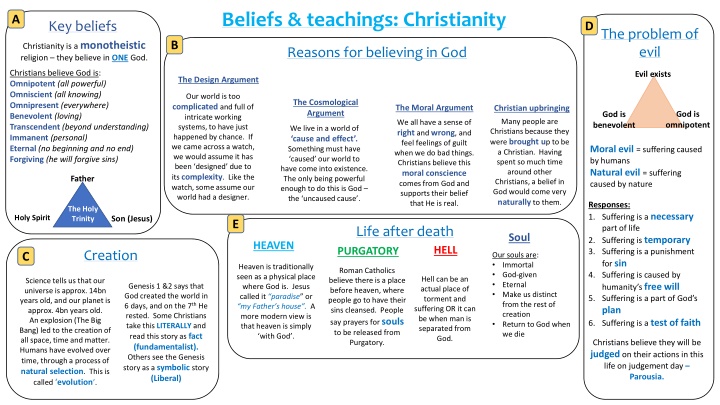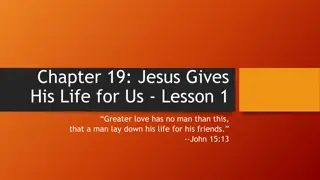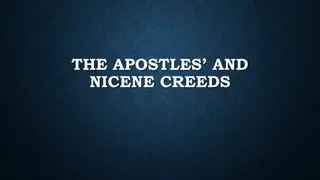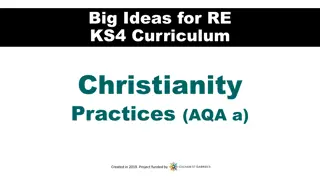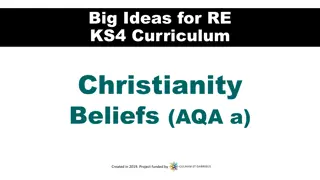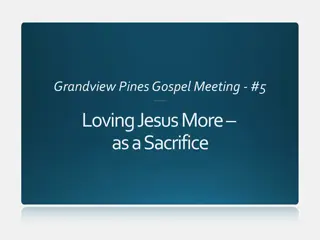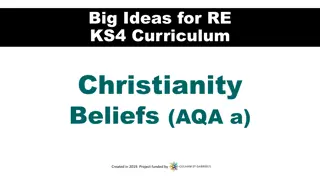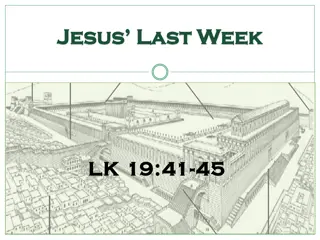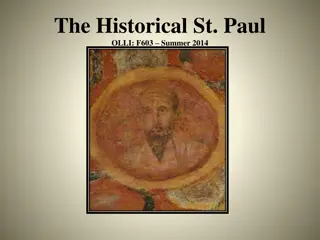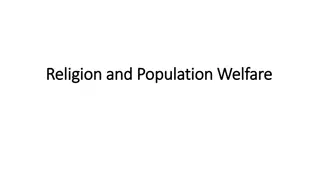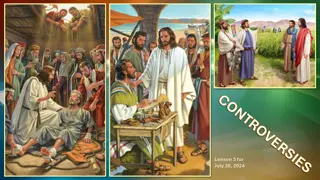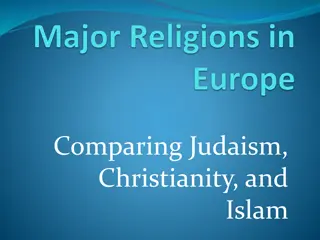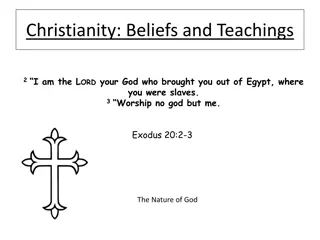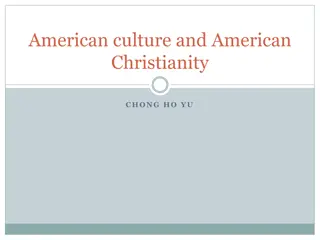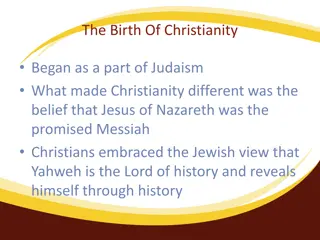Christianity: Key Beliefs, Teachings, and Jesus' Sacrifice
Christianity is a monotheistic religion centered on beliefs in God's omnipotence, benevolence, and the existence of evil. Christians attribute their moral conscience and sense of right and wrong to God. The faith also incorporates teachings about Jesus' suffering and crucifixion, emphasizing forgiveness and eternal life after death. The concept of the Holy Trinity, Purgatory, Heaven, and Hell play crucial roles in Christian beliefs. Additionally, views on creation, evolution, and judgment day vary among different Christian denominations.
Download Presentation

Please find below an Image/Link to download the presentation.
The content on the website is provided AS IS for your information and personal use only. It may not be sold, licensed, or shared on other websites without obtaining consent from the author.If you encounter any issues during the download, it is possible that the publisher has removed the file from their server.
You are allowed to download the files provided on this website for personal or commercial use, subject to the condition that they are used lawfully. All files are the property of their respective owners.
The content on the website is provided AS IS for your information and personal use only. It may not be sold, licensed, or shared on other websites without obtaining consent from the author.
E N D
Presentation Transcript
Beliefs & teachings: Christianity A Key beliefs D The problem of evil B Christianity is a monotheistic religion they believe in ONE God. Reasons for believing in God Christians believe God is: Omnipotent(all powerful) Omniscient(all knowing) Omnipresent(everywhere) Benevolent(loving) Transcendent(beyond understanding) Immanent(personal) Eternal (no beginning and no end) Forgiving (he will forgive sins) Evil exists The Design Argument Our world is too complicated and full of intricate working systems, to have just happened by chance. If we came across a watch, we would assume it has been designed due to its complexity. Like the watch, some assume our world had a designer. The Cosmological Argument The Moral Argument Christian upbringing God is omnipotent God is benevolent Many people are Christians because they were brought up to be a Christian. Having spent so much time around other Christians, a belief in God would come very naturally to them. We all have a sense of right and wrong, and feel feelings of guilt when we do bad things. Christians believe this moral conscience comes from God and supports their belief that He is real. We live in a world of cause and effect . Something must have caused our world to have come into existence. The only being powerful enough to do this is God the uncaused cause . Moral evil = suffering caused by humans Natural evil = suffering caused by nature Father Responses: 1. Suffering is a necessary part of life 2. Suffering is temporary 3. Suffering is a punishment for sin 4. Suffering is caused by humanity s free will 5. Suffering is a part of God s plan 6. Suffering is a test of faith The Holy Trinity Holy Spirit Son (Jesus) E Life after death PURGATORY Soul HEAVEN HELL Creation C Our souls are: Immortal God-given Eternal Make us distinct from the rest of creation Return to God when we die Heaven is traditionally seen as a physical place where God is. Jesus called it paradise or my Father s house . A more modern view is that heaven is simply with God . Roman Catholics believe there is a place before heaven, where people go to have their sins cleansed. People say prayers for souls to be released from Purgatory. Hell can be an actual place of torment and suffering OR it can be when man is separated from God. Science tells us that our universe is approx. 14bn years old, and our planet is approx. 4bn years old. An explosion (The Big Bang) led to the creation of all space, time and matter. Humans have evolved over time, through a process of natural selection. This is called evolution . Genesis 1 &2 says that God created the world in 6 days, and on the 7th He rested. Some Christians take this LITERALLY and read this story as fact (fundamentalist). Others see the Genesis story as a symbolic story (Liberal) Christians believe they will be judged on their actions in this life on judgement day Parousia.
Beliefs & teachings: Christianity Jesus Jesus resurrection & ascension Matthew 28:1-7; Mark 6:1; Luke 24:1-12; John 20:1-9 B The suffering of Christ Parables A story used to teach a lesson or a moral The Good Samaritan Love your neighbour E One of the most detailed stories we have from the whole of Jesus life is the account of how he died. He was sentenced to death by Pontius Pilate, the Roman Governor, and his death was to be by crucifixion. Even though Christians believe that Jesus was the son of God, it does not mean that he was somehow spared the pain and horror of his crucifixion. There are several ways in which the crucifixion affects Christians today: It gives them confidencethat if they accept Jesus sacrifice, sin can no longer destroy their loves because God forgives those who faithfully ask for forgiveness They believe that suffering is a part of life, just as it was a part of Jesus life and that, having experienced it, God understands what the sufferer is going through. C According to the accounts of Jesus burial in the NT, he was placed in a tomb late Friday afternoon (Good Friday). How long he remained there is unclear, but we know that some of Jesus female followers went to the tomb to anoint the body. Though details of the story vary between the 4 gospel accounts, they all make it clear that Jesus was nowhere to be found. The belief that Jesus rose from the dead is known as the resurrection and is a key teaching in the Christian faith. For Christians, it is significant evidence of the divine nature of Jesus. The sheep & the goats Whatever you did for the least of these brothers of mine, you did for me Only Mark and Luke s gospels finish off their story by telling their readers that, after meeting his disciples and asking them to carry on his good work, Jesus left them for the last time and ascended, body and soul, into Heaven. D Salvation Miracles An act which seems to break the laws of nature Salvation means to be saved from a bad situation . In Christianity, this bad situation is sin, and the consequences of sin. Sin has separated humans from God, and salvation enables humans to get close to God again. Christians believe that Jesus death makes up for the original sin committed by Adam & Eve and so can bring people back to god. Jesus knew his death was necessary to restore the relationship between god and the believers and make the opportunity for salvation available to all people. Jesus (as the Son of God) could have easily avoided being crucified. His crucifixion was the result of human evil against an innocent man. It needed to happen, in order to atone for the sins of humanity. A Incarnation Christians believe Jesus is the Son of God. He is God in human form, or God incarnate . The word became flesh and made his dwelling among us Jesus gave humanity an example to follow. Even though Jesus is God in human form, he valued everyone equally: For you are all one in Christ . God sacrificed himself on the cross to take away the sins of human beings: For God so loved the world that He gave His only Son Jesus is both immanent and personal Calming the storm This is a miracle over NATURE Water into wine This was Jesus first miracle Healing a paralysed man This is a HEALING miracle
Practices: Christianity D A F The Church in the local community The Church ahs always been involved in caring for others. For example, in the Middle Ages the monasteries provided education, hospitality for travellers and treatment for the sick. In the 20th century, a London church set up the first Samaritans phone service for those feeling suicidal. In the Parable of the Sheep & the Goats, Jesus told his disciples that whatever they did or failed to do for someone, however insignificant the deed or situation, they did/or failed to do, for Jesus. Worship E Sacraments Liturgical Follows a set routine e.g. RC Non-liturgical- Does not follow a set routine Charismatic informal; spirit-inspired Rosary a string of beads with a crucifix attached Meditation thoughtfulness, focused on a religious truth Quaker meetings Completely informal, with no leader or structure The Bible regardless of the type of worship, it will always have a focus on the Bible Private worshipping alone Prayer Communicating with God Pilgrimage A sacrament = an outward and visible sign of an inward and spiritual grace A pilgrimage is a visit to a place regarded as holy for the believer. Often, the journey is also special. Pilgrimage has always played an important role in the history of Christianity, thought it is not a compulsory duty and many today see no need to go on pilgrimage. Protestant Churches = only 2 sacraments: Baptism and Eucharist. RC & Orthodox Churches = 7 sacraments: Baptism, Eucharist, Confirmation, Reconciliation, Marriage, Holy Orders, Anointing of the Sick. Baptism Jesus was baptised by John and, during the baptism, Jesus experienced the Holy Spirit entering his life and heard God s assurance that he was the Son of God. Some examples of Christian places of pilgrimage are: Lourdes, Iona, the Holy Land (Israel) and Canterbury. Just before his ascension, Jesus told his disciples to: Go and make disciples of all nations, baptising them in the name of the Father, Son and Holy Spirit . Baptism was a rite of initiation into the community right from the start and there are many references to baptism throughout the NT. Eucharist The Eucharist is celebrated by nearly all Christian denominations and has many names, such as Holy Communion. The central features are the same: the connection with Jesus Last Supper, the giving of thanks for the bread and wine (consecration) and using Jesus words at the last supper. RC Christians believe in transubstantiation the bread & wine literally turns into the body & blood of Christ. Whereas Protestants do not believe this. One way in which Christians out their faith into action is through food banks and street pastors. Key organisations(research these!) Corrymeela reconciliation & ecumenism Open Doors Supports persecuted Christians Spring Harvest Mission & evangelism Community of the cross of nails CAFOD Catholic Agency for Overseas Development Tearfund Christian Aid B C Prayer Why is worship important? Jesus spoke about prayer on a number of occasions. Some Christians follow set prayer (such as the Lord s prayer (which Jesus taught his disciples), whereas others make them more personal. It brings a sense of togetherness as a community It makes a person feel closer to God It is peaceful allowing for prayer and meditation It is an external expression of their faith Christians praise God as the eternal Being and source of everything that exists There different types of prayer: Thanksgiving Adoration Confession Petition Intercession
B Beliefs & Teachings: Islam Sunni and Shi a Islam A Key beliefs about God C Sunni Muslims (majority) RISALAH: The Prophets Adam Muhammad There is only ONE God (monotheism). The oneness of God is called Tawhid in Arabic Muslims call God Allah, which means the one true God God cannot be divided and has never had a Son. In the Qur an and the Sunnah, Allah has 99 names . E.g the Merciful, the Just, the Almighty Allah is the same God that Jews and Christians worship Allah has revealed his will through his prophets Muslims share many of the beliefs that Jews and Christians have about God E.g. He is the creator, eternal, omnipotent, omniscient, etc. Allah must never be pictured Allah is beyond understanding and nothing must ever be compared to Allah. Comparing things to Allah is a terrible sin All humans must submit to the will of Allah (Islam means submission ) See the elected Caliphs as the successors of Muhammad Follow the 6 articles of faith : Tawhid, the Day of Judgement, the Prophets, Angels, the supremacy of Allah s will and the authority of the Qur an. Prophethood Ibrahim Allah s final and greatest prophet Received the revelation of the Qur an A great teacher A great role-model A military commander Set up the first Muslim community in Makkah Must be respected but not worshipped Allah appoints particular people to spread his messages These people receive revelation from Allah through his Angels There are 25 key prophets of Allah identified in the Qur an, including Musa (Moses) and Isa (Jesus) One of Allah s most faithful servants Opposed idolatry Risked his life to argue for monotheism A great role- model An ancestor of Muhammad Created specially by Allah. Given dominion over the earth by Allah The first human to communicate with Allah The first Muslim Shia Muslims (minority) See the Imams (descendants of Muhammad) as Muhammad s successors Believe each Imam must choose his successor before he dies Follow the 5 roots of Usul ad- Din: Tawhid, Prophethood, Allah s Justice (Adalat), Resurrection and the Imamate F AKHIRAH: Life after death The Day of Judgment D HEAVEN AND HELL Described in different ways by different Muslims People go to heaven or hell for eternity after the Day of Judgement Heaven described in the Qur an as a garden paradise Hell described in the Qur an as a place of fire and pain Faithful and righteous Muslims will go to heaven Non-Muslims and unrighteous Muslims will go to hell ANGELS When all humans will be judged by Allah based on how they have lived Judgement will lead to punishment (hell) or reward (heaven) Preceded by a state of waiting in the grave called barzakh While in the grave, people are questioned by Angels People will be resurrected before their judgement The Qur an Bring Allah s revelations to his prophets Created by Allah from light Usually invisible but sometimes take human form Pure and sinless Do not have free-will Have various roles Some are named E.g. Jibril, Mika il, Israfil, Iblis The word of Allah given to Muhammad through Jibril Originally dictated in Arabic The original words have never been altered Infallible: corrects all previous revelation from God Divided into Surahs Supplemented by the Hadiths and the Sunnah E Predestination Allah is in total control of all events and knows everything that will happen Because Allah is transcendent (beyond time and space), he is not limited by time or space BUT Allah does not decide what will happen Humans have free-will and are responsible for their choices Humans will be judged by Allah based on their choices
Practices: Islam E Ashura A 10 obligatory acts of Shi a Islam Salah - prayer Sawm fasting Zakah charitable giving Khums 20% tax on income Hajj pilgrimage Jihad Amr-bil-Maruf encouraging people to do what is good Nah Anil Munkar Discouraging people form doing what is wrong Tawallah to be loving towards friends of God Tabarra disassociating from enemies of God. The day of Ashura (Day of remembrance) is a major Shi a festival that takes place on the 10th day of the month of Muharram. 5 pillars of Sunni Islam B 1. 2. 3. 4. 5. 6. 7. Hajj Saum Fasting Abstaining from food, drink, sex and other pleasures during daylight hours, in the month of Ramadan Shi a Muslims remember the death of Hussein (Muhammad s grandson) in Karbala, Iraq. Shahadah Declaration of faith There is no God but Allah and Muhammad is his messenger Zakat Charity Compulsory giving of 2.5% of one s income to charitable causes Salat Prayer Performing ritual prayers in the proper way 5 times a day Pilgrimage It is the duty of every Muslim to perform the pilgrimage to Mecca at least once in their lifetime In many Muslim countries a public holiday takes place. Some Muslims will beat themselves with chains, beat their chest or (a minority) cut themselves. For Sunni Muslims, Ashura is a day when many fast voluntarily. 8. 9. 10. F Jihad D Festivals C Jihad is an important concept for Muslims. It refers to struggling against evil, either as an individual or as the collective fellowship of Islam. Salah It is said that when Muhammad arrived in Medina, he noticed people were celebrating 2 days with entertainment and activities. Muhammad explained that God had appointed 2 other days that are better to celebrate Wudu: Ritual washing before prayer Jummah prayer: Friday, midday prayer Rak ah: One unit of prayer with movements an recitations Qibla: Direction of Mecca Greater jihad is a personal, inward struggle of all Muslims to live in line with the teachings of their faith. Why? How? Remembers & honours Ibrahim, who was willing to sacrifice his son on Allah s command Forms a part of Hajj; Animals are sacrificed; Give money to the poor; cards & presents Eid-il-Adha Lesser jihad is seen as the outward struggle to defend Islam from threat. In the early days of the faith, this was important when Muslims were being persecuted and they needed to protect their freedom to practise their faith. Marks the end of the month of Ramadan Prayers; decorations; best clothes; feasts; cards & presents Eid-ul-Fitr
Theme A: Relationships & families Theme A: Relationships & families Sexual relationships Sexual relationships Roman Catholics believe that sex should have 2 purposes: to UNITE a couple in married love and to CREATE new life. Pre-marital sex is a sin, as is masturbation (as it cannot lead to procreation). Some other Christians accept sex before marriage in a committed and loving relationship, as it is an expression of love. The Bible says Do not commit adultery , so having sex with someone other than your marriage partner is committing a sin. Islam teaches that it is a religious duty to marry & have children. Every person should be a virgin before marriage, and observe chastity before and during marriage. C Contraception Contraception Marriage & divorce Marriage & divorce Marriage is a sacrament in some Christian traditions; it brings a blessing from god. In marriage, a couple promise to each other through vows/promises, to be good to each other, to be faithful, to love and cherish each other, until the marriage is ended by death. The rings represent the eternal bond the couple are entering into, in front of God. B A Artificial man made e.g. condom Natural a type of practice or behaviour aimed at preventing pregnancy e.g. NFP (natural family planning) Christianity teaches that sex should be open to the possibility of procreation. Therefore, by using contraception, you are preventing procreation from happening. The Roman Catholic Church teaches that the use of contraception is a sin. The Church of England teaches that sex should open to procreation, however, it accepts that sex is also an expression of loveand promotes responsible parenthood. Therefore, the use of contraception is encouraged if you cannot properly look after an raise a child. You should wait until you re ready. D Gender equality Gender equality For RC Christians, divorce is always wrong. Marriage is a sacrament which cannot be broken. The vows state until death do us part and these promises are binding. Traditionally, men have held positions of authority in most religions. However, there is a debate about what the role of women should be. In the RC Church women cannot become priests. Many argue this because: Jesus had male disciples; Jesus chose a man to lead his Church after his ascension (Peter); A woman cannot completely represent Christ during the Eucharist. In the C of E women can become both vicars and bishops. Some of the earliest converts to Christianity were women, for example Priscilla at Ephesus. There is neither Jew nor gentile, neither slave nor free, nor is there male and females, for you are all one in Christ (Galatians 3:28) So God created mankind in His own image, in the image of God he created them; male and female he created them (Genesis 1:27) Islam teaches that children are a blessing from God, if a couple wishes to have them. Muhammad taught that parents should only have as many children as they can properly look after responsible parenthood. So Muslims can and should use contraception. It is possible to have an annulment, which is where the marriage is set aside, as if it were never real. For most other Christians, divorce is discouraged but acceptable as a last resort. It is sometimes the lesser of two evils, and also a necessary evil. Homosexual relationships Homosexual relationships For some Christians, homosexual sex is thought to be unnatural and cannot lead to pregnancy, so it is a sin and it is wrong. In places, the Bible also says it is wrong for a man to sleep with another man, which has also been used to show that homosexuality is wrong. The Qur an sets out specific punishments for those who have homosexual relationships. It calls these people fornicators, and punishment is severe e.g. flogging or execution. F E Families Families Nuclear mum & dad + children Extended Nuclear family + other relatives Single-parent mum or dad + children Polygamy illegal in the UK. Man + more than 1 wife Many people would argue that the best place for raising children is within a family environment/ Religious families also provide a basis for a religious upbringing, enabling parents to educate their child in a faith. Christianity teaches: God hates divorce (OT) Whoever divorces then marries another; it as if he committed adultery (Jesus) We should forgive those who wrong us and show love to all (Jesus)
Theme B: Religion and Life The Use of Animals Many medicines are tested on animals before they can be used on humans to ensure that they are safe. This is very controversial because many people think that it cruel and unnecessary. However others believe that animal experimentation is necessary to make breakthroughs in science and technology, and to manufacture effective cures. For example many surgical procedures such as transplantation surgery were traditionally perfected on animals. Christians and Muslims are allowed to eat meat in their diets, although Muslims do not eat pork and some Christians fast during Lent. Vegetarian: a person who does not eat meat. B D Origins of the Universe and Life Some Christians believe that the universe was created by God in 7 days. This is described in the bible in the book of Genesis. The bible says that Adam and Eve were the first man and women. Christians who believe the literal truth of the bible are known as Creationists. Other Christians think the creation story is a metaphor for the creation of the Universe, but do not believe that the world was created in 7 days. Scientists believe that the Universe was created billions of years ago and is constantly evolving. This is known a the Big Bang Theory. Charles Darwin was a famous scientist who came up with the theories of evolution and natural selection. This theory explains that humans are descended from apes and that species are constantly evolving to adapt to their changing environment. E Euthanasia C F Euthanasia is illegal in the UK, It can be seen as assisted suicide, therefore breaking the Suicide Act of 1961. It can be viewed as manslaughter or murder and carries a prison sentence. Some people believe that people should have the right to end their own life if they are terminally ill, incapacitated or in severe pain. This is known as euthanasia. In the UK, this is currently against the law, although in some other countries it is legal (Switzerland, Netherlands and Belgium). Some Christians believe that people should not be able to end their own life because all life is sacred, and that the terminally ill should be cared for in hospices at the end of their lives. Abortion The law defines abortion as the deliberate expulsion of a foetus from the womb, with the intention of destroying it . In the UK abortion is allowed up until 24 weeks of a pregnancy under special circumstances, i.e. if two registered doctors agree that there is a danger to the women s mental or physical health, the foetus will be born with disabilities, or the mental or physical health of existing children will be put at risk. Some people do not believe that abortion is right because it means terminating the life of an unborn child. However, many people believe that it is the woman who should have the choice as to what happens to her body and therefore it is for her to make up her own mind. There are also circumstances such as rape, genetic abnormalities or failed contraception which cause debate on both sides of the argument. In Islam, the life of the mother takes precedence she is a fully developed human with responsibilities, whereas the foetus is not even born and will need everything doing for it. Pro-Life: term used for arguments against abortion Pro-choice: arguments in favour of having the CHOICE to choose an abortion Islam tells us that Euthanasia is zulm: wrong doing against Allah. Active euthanasia: being given lethal drugs to end a persons life so there illness does not kill them. Passive euthanasia: a person stops taking medication to end their life. A Sanctity of Life Many religions believe that life is sacred because God created it, including Islam and Christianity. Christians believe that all life is sacred, and precious. Some Christians do not believe that anyone should take their own life or the life of someone else. Therefore some Christians believe that euthanasia and abortion is wrong, as it is wrong to end a human life. In all legal systems murder is the worst crime you could commit. Stewardship: the idea that God created the world and that humans have a responsibility to look after it. Dominion: the belief that God gave humans the right to decide what happens to the world and the species in it.
Violence & violent protest G Theme D: Religion, peace & conflict WMD A Weapons of mass destruction are capable of killing & maiming large groups of people. These weaons are considered unjust because they kill civilians. Some religious believers accept the existence of nuclear weapons as a deterrent. Christianity teaches non-violence, as Jesus said Blessed are the peacemakers and told others to turn the other cheek in the face of violence. Christians are told to love their enemies and love each other. However, God gave humans free will and choice and sometimes non-violent protest is ignored, so violence may be used to force change for the common good. B Peace & justice Justice = fairness; Peace = to live in harmony & without fear Christians will fight for justice under the conditions of The just war theory. Whilst God desires peace, He also desires that humans should live in justice and freedom. The Roman Catholic Church does not agree with the use of WMD but thinks they are acceptable as a deterrent. D Forgiveness & reconciliation Reconciliation = making up between two groups after a disagreement Islam means peace and Muslims should act in a peaceful manner, but violence may be used in self-defence. Muslims have a duty to protest about anything unfair and in the UK we have seen protests over wars and issues in the Middle East, what is perceived as Islamophobia, terrorism and racism issues. The Quaker Society utterly condemn WMD. They are pacifists, and no outward weapons are acceptable. WMD are indiscriminate and beyond control. To be a Christian means to forgive the inexcusable, because God has forgiven the inexcusable in you ~ C.S. Lewis Forgive seventy times seven ~ Jesus Love your enemies, and pray for those who persecute you ~ Jesus F Religion & peace making E Pacifism Christianity teaches to love your neighbour and Islam means peace if both of these teaching were adhered to then there would be peace. Religious groups are regularly involved in peace-keeping in war torn areas and in negotiations to prevent wars happening. C Just War & Holy war Holy war = it is right to fight in the name of God Just war = It is right to fight in the interests of justice & the greater good Pacifists believe that all violence is morally wrong. They will not participate in any war, regardless of the reasons for that war. An example of a pacifist Christian group is The Quakers. Conscientious objectors are people who refuse to participate directly in fighting wars on the grounds of conscience. However they will assist in non-military ways such as medics, relief work and mediators. Many believe they have a peace-keeping role. For Muslims a holy war is a just war. There are rules for how Muslims should fight a war ibn the Qur an. A jihad may only be fought as a last resort and must never be against a Muslim nation. On occasions people have claimed that religion is the cause of war. For example, some fundamentalist groups such as ISIS believe that an Islamic State needs to be created. Sometimes even with all the best efforts, religion cannot keep peace because there are overriding factors, such as the craving for power, the need to react or attack or to join allies to protect others. The Church of England accepts the just war theory and sees wars as necessary in certain conditions, especially in situations where wars are waged to fight injustice. St Paul said Christians should obey their rulers, who had been given power by God. St Augustine was the first to try to write a set of rules regarding this, and eventually the just war rules were written in detail by St Thomas Aquinas. Sometimes if you do not fight, you allow a greater evil to happen than a war would have caused, so you have to fight. Buddhism is a pacifistic religion. The Five precepts demand a pacifistic approach to life. The Dalai Lama said that Peace can exist if everyone respects all others .
Good & evil actions and intentions A F Theme E: Religion, crime and punishment The death penalty Abolished in the UK in 1965 and is now illegal in many EU countries. The Principle of Utility = an action is right if it promotes the maximum happiness for the maximum number of people. The sanctity of life = God gave life, so only He has the right to take it away. B Reasons for crime & types of crime Causes of crime include: upbringing, mental illness, poverty, opposition to existing laws, greed/hate, or addiction. Some people suggest that those who commit the worst crimes are evil. But where does evil come from? Christianity: Evil is seen as the abuse of the free will God gave to humans. In order to be able to appreciate good, then evil has to exist. Most Christians believe in a figure called the devil or Satan. So, evil is a combination of internal and external factors. There are 3 key types of crimes: Crimes against the person (e.g. murder); Crimes against property (e.g. burglary); Crimes against the state (e.g. terrorism). St Paul tells Christians to obey the laws of the land For Against C Suffering It is a justifiable retribution for serious crimes It is a deterrent It gives the victim s family a sense of justice Only God has the right to take life Jesus taught a message of love and forgiveness It is hypocritical Islam: The Qu ran says there is a devil who was an angel. Iblis was expelled from paradise because he refused to bow to Adam. Iblis continually tempts and punishes humans to be wicked. Evil is a mix of powerful evil being and the weakness of humans. For many people, suffering is an unfortunate part of living. It may be caused by something natural, such as an illness, or it may be due to how people have behaved. Whatever the cause, Christians believe they should try to help others who are suffering. Christians feel that they should follow the example of Jesus, who helped many whom he saw were suffering, and who taught that those who believe in God should help those who suffer. Heller Keller was a Christian writer and activist who became deaf and blind when she was only 19 months old. She said We are never really happy until we try to brighten the lives of others . D 3 aims of punishment Treatment of criminals E G Retribution: is the least positive of the 3 aims of punishment. It means that society, on behalf of the victim, is getting its own back on the offender. In the Old Testament it is referred to as lex talionis (the law of retaliation). An eye for an eye, a tooth for a tooth Forgiveness Christians do not disagree with discipline. They see a positive need for it: He who spares the rod hates their children, but the one who loves their children is careful to discipline them .However, they may question the method used since Jesus teachings on love and caring for people rule out any physical punishment. Instead, Christians focus on positive sanctions that help offenders to realise the error of their ways and reform. Jesus always treated people with respect, and Christians believe they should follow his example. Forgiveness is a core Christian belief and one Jesus emphasised in his teachings. Christians are expected to be forgiving towards those who wrong them, if they expect to be forgiven themselves: Forgive us our sins, as we forgive those who sin against us . Deterrence: This is the belief that if offenders are seen to be punished for wrongdoing, then this may put off others from committing that offence. The offender themselves might also be put off from reoffending. Reformation: This is the aim of punishment most Christians prefer because it seeks to help offenders by working with them to help them understand that their behaviour is harming society. It is hoped that offenders will change their attitudes and become responsible, law-abiding members of the community. Corporal punishment: to punish the offender by causing physical pain. It is illegal in the UK but allowed in some other parts of the world. For example some Muslim countries such as Iran and Saudi Arabia, allow caning as punishment for offences such as gambling and sexual promiscuity. Community service: offers offenders a chance to make up for what they have done and receive help in reforming their behaviour. Christians are in general agreement that it is a suitable punishment for fairly minor offences. Many Christians would argue that forgiveness is not a replacement for punishment. During his ministry Jesus was asked how many times you should forgive someone who wrongs you and he replied I tell you not seven times, but seventy-seven times
